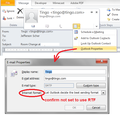
Why doesn't sending in txt from Outlook help attached pdf files arriving as winmail.dat
I send pdf files as attachments of Outlook email to a list that includes myself and my wife. We use gmail and both use T'bird as our client on our home computer. Hers end up as winmail.dat, while mine are fine. And hers is fine while it is still in gmail. I have tried sending these files using the plain txt format in Outlook but that does not help. What next?
被選擇的解決方法
I assume you mean Outlook, the program that is part of Office, rather than Outlook on the web, the new iteration of Hotmail and Live Mail.
There is an ancient setting in the address book from the early days of Outlook which allowed you to specify a sending format on a per-recipient basis. That is hard to find now, but if you hover the addressee in the message header area and open Outlook Properties, you can check that the addressee is not individually designated to get Outlook Rich Text Format. I have attached a screen shot for reference.
If that's not it, you might try Microsoft's support forums, as it might be too obscure for this one.
從原來的回覆中察看解決方案 👍 1所有回覆 (1)
選擇的解決方法
I assume you mean Outlook, the program that is part of Office, rather than Outlook on the web, the new iteration of Hotmail and Live Mail.
There is an ancient setting in the address book from the early days of Outlook which allowed you to specify a sending format on a per-recipient basis. That is hard to find now, but if you hover the addressee in the message header area and open Outlook Properties, you can check that the addressee is not individually designated to get Outlook Rich Text Format. I have attached a screen shot for reference.
If that's not it, you might try Microsoft's support forums, as it might be too obscure for this one.

